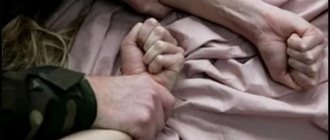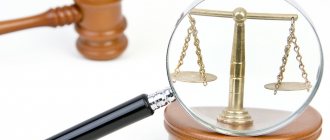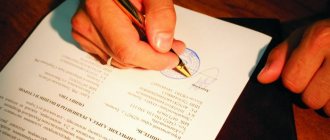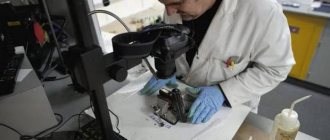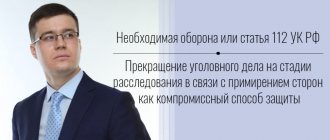Expert activity
When solving various cases arising in investigative and judicial practice, forensic medical examination (FME) plays an important role. An analysis of criminal cases involving crimes against the life and health of citizens shows that in almost 90% of cases the main and often the only evidence in the case is the conclusion of the forensic investigation.
Forensic medical examination is a scientific and practical research regulated by law and conducted by a forensic medical expert, during which specific objects are examined to resolve specific medical issues that arise during the investigation of crimes or when a crime is suspected.
The objects of forensic medical examination are living people, corpses and various objects that served as instruments of crime, retained traces of a crime, were the object of criminal actions, as well as any other objects that could be a means of detecting a crime (material evidence).
FEI is carried out by order of the person conducting the inquiry, investigator, prosecutor, as well as by court ruling in all cases provided for in Article 79 of the Code of Criminal Procedure of the Russian Federation (mandatory examination):
- To establish the cause of death and the nature of bodily injuries;
- To determine the mental state of the accused or suspect in cases where doubt arises about his sanity or ability at the time of the proceedings to be aware of his actions or to control them;
- To determine the mental or physical state of a witness or victim in cases where there is doubt about his ability to correctly perceive circumstances relevant to the case and give correct testimony about them;
- To establish the age of the accused, suspect or victim in cases where this is relevant to the case and there are no documents on age.
Expert activities are regulated by the following legal acts of the Russian Federation:
- Criminal Procedure Code of the Russian Federation
- Criminal Code of the Russian Federation
- Civil Procedure Code of the Russian Federation.
- Code of Administrative Offenses of the Russian Federation
- Federal Law No. 73-FZ of May 31, 2001 - On state forensic activities in the Russian Federation
- Order of the Ministry of Health and Social Development No. 346n dated May 12, 2010 - On approval of the procedure for organizing and conducting forensic medical examinations in state forensic institutions of the Russian Federation
- Decree of the Government of the Russian Federation N522 of August 17, 2007 On approval of rules for determining the severity of harm caused to human health.
- Order of the Ministry of Health and Social Development No. 194n dated April 24, 2008 - On approval of medical criteria for determining the severity of harm caused to human health
- Federal Law No. 242-FZ of December 3, 2008 - On state genomic registration in the Russian Federation
The procedure for using special, including medical, knowledge in legal proceedings is regulated by the norms of civil and criminal procedural law. According to Art. 78 Code of Criminal Procedure of the Russian Federation and Art. 79 of the Code of Civil Procedure of the Russian Federation, an examination is appointed in cases where, during a criminal (or civil) case during a preliminary investigation or during a trial, special knowledge in science, technology, art or craft is required. Forensic examinations are carried out by experts from the relevant state (or non-state) expert institutions. In accordance with Art. 80 Code of Criminal Procedure of the Russian Federation and Art. 86 of the Code of Civil Procedure of the Russian Federation, an expert, regardless of his permanent place of work, gives an opinion on his own behalf on the basis of research carried out in accordance with this special knowledge and bears personal responsibility for the conclusion given by him. The conclusion of an expert (a government agency, a private entity or an individual worker) is not binding on the person conducting the inquiry, the investigator, the prosecutor and the court, but their disagreement with the conclusion must be motivated.
The range of issues within the competence of forensic experts is quite wide. First of all, as follows from Art. 79 of the Code of Criminal Procedure of the Russian Federation , the appointment of a forensic medical examination is mandatory to establish the cause of death and the nature of bodily injuries, to determine the mental or physical state of the accused, suspect or witness, to establish the age of the participants in the process. In addition, the authorized person has the right to order a forensic medical examination in cases that are not mandatory, but when special knowledge in the field of medicine is necessary to make a legal decision.
The current Civil Procedure Code does not define cases when a medical forensic examination is mandatory. However, guided by Art. 79 and 80 of the Code of Civil Procedure of the Russian Federation , the court has the right to order a forensic medical examination if issues arise during the consideration of the case that require special knowledge in the field of medicine. In particular, examination is used to establish:
- the degree of loss of general and (or) professional ability to work resulting from injuries and injuries that require compensation for material damage by the perpetrator of these injuries;
- the fact of improper provision of medical care, resulting in death by negligence or harm to health;
- disputed paternity, etc.
Rights and responsibilities of an expert
An equally important condition for the professional activity of any (including medical) forensic expert is the regulation of his rights and responsibilities during the conduct of a forensic examination. The rights of a forensic expert are clearly regulated by Art. 57 of the Code of Criminal Procedure and Art. 85 Code of Civil Procedure of the Russian Federation . In our opinion, they are set out in more detail in the Criminal Procedure Code.
According to Part 3 of Art. 57 Code of Criminal Procedure of the Russian Federation , the expert has the right:
1. Get acquainted with the materials of the criminal case related to the subject of the forensic examination. Let us explain this situation with the following example. In the decision to order a forensic medical examination, its initiator asked the expert about the possibility of causing a stab wound to the chest with damage to the upper lobe of the right lung, which caused the death of the victim, under the circumstances specified in the protocol of interrogation of the suspect. The expert was able to answer this question only after studying the materials of the criminal case provided by the investigator.
2. Request that he be provided with additional materials necessary to give an opinion, or that other experts be involved in the forensic examination. For example, during a forensic medical examination ordered following a traffic accident in which a pedestrian died, the expert had to find out the mechanism of injury to the deceased. To answer this question, the expert requested the results of an automotive technical examination of the vehicle. The expert's request was granted.
3. Participate, with the permission of the investigator, inquiry officer and the court, in procedural actions and ask questions related to the subject of the forensic examination. For example, Mr. N. was suspected of committing premeditated murder using a hunting firearm. On the body of the deceased, a forensic expert discovered a blind gunshot wound to the posterior surface of the chest on the left with damage to the heart, which was the cause of death. At the same time, neither forensic nor forensic ballistic examinations revealed traces of the so-called accompanying factors of the shot (particles of soot, unburned powder, gun lubricant) on the clothes and body of the deceased, which indicates a shot from a short distance (according to the forensic classification) . From the protocol of interrogation of the murder suspect, it was known that he and a group of friends (among whom was the deceased) went hunting for wild boar. Before the start of the hunt, the participants were distributed according to their locations and sectors of fire. However, the deceased, without informing the other participants in the hunt, decided to change the location, and, moving to another area, came into the firing range of the suspect, who fired at the sound of movement. To clarify the circumstances, a forensic expert and a ballistics expert petitioned to conduct an investigative experiment at the scene of the incident involving the suspect. During the experiment, the picture of the incident was reconstructed. Taking into account the location of the discovery of the deceased, the location of the shooter, the course of the wound channel from the bullet in the body of the deceased, the experts concluded that it was possible to cause fatal damage under the circumstances specified in the interrogation report of the suspect. Thus, the legal qualification of this act was changed from intentional murder to causing death by negligence.
4. Give an opinion within the limits of your competence, including on issues that, although not raised in the decision on the appointment of a forensic examination, are related to the subject of the expert study. This gives the expert the right to the so-called expert initiative, i.e., it allows, in the interests of the examination, to independently expand the range of issues covered. Let's explain this with the following example. An 85-year-old patient died while receiving medical care in a specialized department of a large city multidisciplinary hospital. During the pathological examination of the corpse, a discrepancy between the clinical and pathological diagnosis of the underlying disease was established. The patient was in the hospital for several hours. At first glance, the situation is clear - the adverse consequences of treatment developed as a result of so-called objective factors, i.e. the patient’s short stay in a medical institution and the impossibility of carrying out the entire range of diagnostic and treatment measures.
The questions posed to the expert concerned the correctness of the provision of medical care in this medical institution. After reviewing the case materials, the expert found in the protocol of interrogation of relatives a statement that a day before hospitalization, an emergency medical team was called to the patient. The expert requested medical documents from the ambulance station, from which it became known that in this case there was a defect in the provision of medical care by the doctor of the emergency medical team, in particular, the anamnesis was poorly collected and all the necessary diagnostic measures were not carried out, which subsequently led to the onset of unfavorable events. consequences (death of the patient). Thus, having shown expert initiative, the forensic expert answered a question that allowed him to clarify the situation and give the correct conclusion, since this was within the scope of his professional interests.
5. File complaints against actions (inaction) and decisions of the inquirer, investigator, prosecutor and court that limit his rights. This point, in our opinion, needs no comment.
6. Refuse to give an opinion on issues that go beyond the expert’s special knowledge, as well as if the materials provided for examination are not enough to give an opinion. The refusal to provide an opinion must be stated by the expert in writing, outlining the reasons for the refusal. Often, decisions on the appointment of medical forensic examinations include questions the answers to which are not within the competence of the forensic expert, i.e., do not relate to medical science. Most often, for example, the question is asked about the disfigurement of a person’s external appearance as a result of injuries suffered. Neither the expert nor the commission of experts has the right to answer this question. The concept of “disfigurement” is legal, therefore, it is established not by an expert, but by a court. A forensic expert determines the presence of the injuries themselves and determines whether they are considered permanent. Let us give an example when an expert may refuse to give an opinion due to insufficient materials submitted for examination. When ordering a medical forensic examination related to establishing the severity of harm to a person’s health caused as a result of various injuries, the initiator of the appointment of the examination is obliged to provide the expert with the originals of all medical documents (medical histories, outpatient records, etc.), and not only starting from the moment of injury , but also those preceding it. If the initiator for some reason did not provide the expert with all the necessary documentation, the forensic expert, guided by clause 27 of the Medical criteria for determining the severity of harm caused to human health, approved by order of the Ministry of Health and Social Development of Russia dated April 24, 2008 No. 194n, has the right to return all materials, without executing the decision to appoint an examination.
Restriction of expert rights
The rights of the expert are limited by Part 4 of Art. 57 Code of Criminal Procedure of the Russian Federation . Thus, an expert does not have the right to: 1) negotiate with participants in criminal proceedings on issues related to the conduct of a forensic examination without the knowledge of the investigator and the court; 2) independently collect materials for expert research; 3) conduct research without the permission of the inquirer, investigator, or court that could lead to the complete or partial destruction of objects, or a change in their appearance or basic properties; 4) give a knowingly false conclusion; 5) disclose preliminary investigation data that became known to him in connection with his participation in a criminal case as an expert, if he was warned about this in advance in the manner prescribed by law.
For the disclosure of preliminary investigation data, the expert is responsible in accordance with Art. 310 of the Criminal Code of the Russian Federation . In addition, regardless of the type of legal proceedings (criminal or civil), the forensic expert in whose proceedings this examination is carried out is warned of criminal liability for giving a knowingly false conclusion (Article 307 of the Criminal Code of the Russian Federation) .
It should be noted that the rules governing the professional activities of a forensic expert are also contained in the Civil Code. In particular, Art. 85 of the Code of Civil Procedure of the Russian Federation , which establishes the rights and obligations of an expert in civil proceedings, provides the following.
1. The expert is obliged to accept the examination assigned to him by the court and conduct a full study of the presented materials and documents; give a reasoned and objective opinion on the questions posed to him and send it to the court that ordered the examination. If the questions posed go beyond the expert’s special knowledge or the materials and documents are unsuitable or insufficient for conducting research and giving an opinion, the expert is obliged to send a reasoned message in writing to the court that appointed the examination about the impossibility of giving an opinion. The expert ensures the safety of the materials and documents presented to him for examination and returns them to the court along with an opinion or a message about the impossibility of giving an opinion. 2. The expert does not have the right to independently collect materials for conducting the examination; enter into personal contacts with the participants in the process if this calls into question his disinterest in the outcome of the case; disclose information that became known to him in connection with the examination, or inform anyone about the results of the examination, with the exception of the court that appointed it. An expert or a forensic institution does not have the right to refuse to conduct an examination assigned to him within the time period established by the court, citing the refusal of the party to pay for the examination before it is carried out. 3. The expert, insofar as it is necessary to give an opinion, has the right to familiarize himself with the case materials related to the subject of the examination; ask the court to provide him with additional materials and documents for research; ask questions to persons participating in the case and witnesses at the court hearing; apply for the involvement of other experts in the examination.
The duties of a forensic expert are also enshrined in Art. 16 of the Federal Law of May 31, 2001 No. 73-FZ “On state forensic activity in the Russian Federation” . It, in relation to the state forensic expert, states that he does not have the right to accept orders to conduct a forensic examination directly from any bodies or persons, with the exception of the head of the state forensic expert institution.
Thus, the current criminal and civil legislation of the Russian Federation quite clearly defines the rights and responsibilities of a forensic expert (in particular, a forensic expert) when carrying out his professional activities. The ability to use their rights in their work, as shown in the examples given, will allow experts to improve the quality and evidentiary value of the expert product.
Expert certification
The procedure and rules for certification of experts involved in the examination are approved by Decree of the Government of the Russian Federation dated December 29, 2020 No. 2328.
The period for expert certification is up to 60 working days.
Certification can be:
- valid for at least 5 years (general rule);
- one-time – for the duration of the control (supervision) event;
- indefinite (if necessary).
A qualifying exam for certification is not always carried out, but only when necessary.
The control (supervisory) body enters information about the expert’s certification into an open register on its official website.
One of the grounds for termination of an expert’s certification is confirmation by a control (supervisory) body of the unreliability or bias of the results of his activities.
Suspension of an expert's certification occurs upon his admission to the state or municipal service, as well as upon employment by the control (supervisory) body that made the decision on his certification.
Expert certifications issued before 07/01/2021 are valid until their expiration date.
How experts work
Documents drawn up by experts must be electronic with an enhanced qualified signature (Part 1, Article 21 of Law No. 248-FZ). This rule is effective from December 31, 2023. But the Government of the Russian Federation may, within the framework of certain types of state control, introduce this rule earlier.
The regulation on the type of control may establish the specifics of conducting examinations in shorter terms and volume.
The decision to conduct a control (supervisory) event, among other things, must indicate the experts or the name of the expert organization involved.
Experts and expert organizations are reimbursed for expenses incurred by them in connection with participation in control (supervisory) activities, if the procedure for reimbursement is established by the federal law on the type of control (Article 35 of Law No. 248-FZ).
Who pays?
The amount of remuneration is agreed upon by the participants in the case and the expert and (or) institution (Resolution of the Plenum of the Supreme Arbitration Court of the Russian Federation No. 23 “On some issues of practice in the application of legislation on examination by arbitration courts”). The research is paid for by the plaintiff or the defendant, if one of them initiated the examination. If both parties have done this, then the cost of the study is divided equally between them. What if the parties did not request an examination, but the court ordered one? Then the costs are reimbursed from the budget with one caveat: if a participant in the case sabotages the research, as a result of which its further implementation becomes impossible, he pays for the work done (Article 111 of the APC).
What are the requirements for an expert?
The examination is performed by a person with certain knowledge, without which a full-fledged study is impossible. For example, a linguistic examination is carried out by a linguist, and a construction examination is carried out by a civil engineer. To engage in this activity, a person must confirm his competence with documents on higher education, completion of expert training and certification (Article 13 of Federal Law No. 73-FZ).
The expert must be independent. This is important, because dependence results in interest, which can affect the objectivity of the specialist’s opinion. If the court has reasons to doubt the expert’s disinterest, then he is subject to recusal (Article 70 of the Code of Criminal Procedure).
What rights and responsibilities does an expert have?
Being a subject of procedural legal relations, an expert is endowed with rights and responsibilities. He is obliged (Article 16 of Federal Law No. 73-FZ):
- carry out the examination in full, provide a reasoned conclusion;
- carry out the examination solely on the instructions of the management of the government agency;
- examine only the objects and materials provided, preserving them in their original form;
- request permission to use methods that involve a strong impact on the object;
- not to disclose information regarding the dispute or research;
- not to contact the participants in the process if this raises doubts about his disinterest.
The expert is vested with the following rights (Article 17 of Federal Law No. 73-FZ):
- draw conclusions and give answers to related questions that are important for the dispute, but were not raised initially;
- claim misinterpretation of its findings;
- ask for the involvement of other experts;
- appeal against the customer’s actions that in any way violate his rights.
Where to find a forensic expert - review of the TOP 3 service companies
Many well-known companies meet all of the above criteria, but I bring to your attention only 3 of them.
1) Federation of Forensic Experts
This company provides services in conducting a huge number of various forensic examinations. The website has an online form for requesting a forensic examination. After filling it out, a company specialist will contact you and clarify the details. If necessary, he will help formulate questions.
Thus, you can not only order an examination on the website, but also periodically check its readiness. A very convenient service for those who are used to solving their affairs using the Internet.
2) Sudex
The Chamber unites 141 organizations and 1,403 specialists from 68 regions of Russia under its brand. It conducts research activities, and it is possible to order high-tech expertise, which is simply not available in many cities. All specialists of the organization are professionals with many years of experience and relevant qualifications.
3) Forensic examination
This company specializes in conducting construction inspections. If you want to identify violations during the construction of construction projects or challenge the actions of the contractor, contact the Forensic Expertise. Here you can not only carry out expert actions, but also receive a full range of services to support your construction project.
Types of expert research carried out in the field of construction:
| № | Construction and technical expertise | Design | Work of a forensic appraiser |
| 1 | Quality, cost, damage | Drawing up and examination of technical specifications | Cars and other transport |
| 2 | Design expertise | Development of a master plan | Land issues |
| 3 | Inspection of load-bearing structures and defects | Drawing up all types of projects and their examination | Real estate |
| 4 | Expert support for repairs, construction or reconstruction | Estimation work, verification and expert study of the estimated cost | Business valuation |

